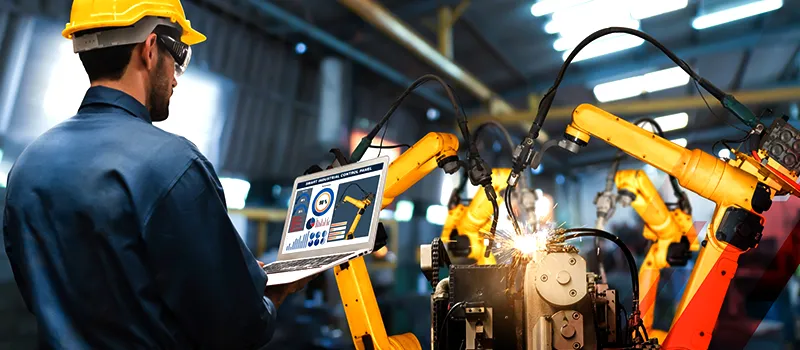Robotic process automation (RPA) has become a practical solution for organizations looking to streamline operations without rebuilding their existing systems. As digital transformation accelerates across industries, businesses are actively searching for technologies that deliver fast results, measurable efficiency, and scalability. Among these, the robotic process automation benefits stand out because RPA focuses on automating repetitive, rule-based tasks that consume time and resources.
Unlike complex automation platforms that require deep integration, RPA works at the user interface level. Software bots mimic human actions such as logging into systems, copying data, validating information, and triggering workflows. This simplicity explains why RPA adoption continues to grow and why decision-makers are evaluating both the advantages and limitations before implementation. Based on these parameters, the global robotic process automation market is likely to generate a valuation of $19.83 billion by 2031, as estimated by Kings Research.
What Is RPA and How Does It Work?
To understand the robotic process automation benefits, it is essential to first answer a common question: what is RPA? Robotic process automation is a technology that uses software bots to execute structured, repetitive digital tasks by following predefined rules. These bots interact with applications just as humans do, without altering the underlying systems.
RPA is particularly effective in environments where processes are standardized and data-driven. Because it does not require advanced programming skills, organizations can deploy RPA faster than many traditional automation solutions. This ease of use has expanded the applications of RPA across multiple business functions.
Core Robotic Process Automation Benefits for Organizations
Improved Efficiency and Speed:
One of the most widely recognized robotic process automation benefits is improved operational efficiency. Manual tasks often slow down processes due to human limitations, handoffs, and errors. RPA bots operate continuously, processing tasks faster and more consistently.
From data entry to report generation, automation reduces cycle times and allows businesses to scale operations without increasing headcount. This efficiency gain is a key reason why companies across industries are adopting RPA. In the U.S. public sector, federal RPA programs have created nearly 1,000 automations and freed up almost 1.5 million hours of work capacity, highlighting the measurable efficiency impact of automation initiatives.
Cost Savings and Resource Optimization:
Cost reduction remains a primary motivation behind RPA investments. By automating repetitive work, organizations reduce dependency on manual labor for routine tasks. Over time, these savings outweigh the initial implementation costs.
The robotic process automation benefits also include better resource utilization. Employees can shift their focus from administrative work to higher-value activities such as analysis, strategy, and customer engagement. Federal data shows that RPA deployments across U.S. government agencies grew 110% year over year, while the annualized hours of work capacity created through automation increased by 195%, demonstrating significant resource optimization gains.
Accuracy, Compliance, and Audit Readiness:
Human error is unavoidable in repetitive tasks, especially those involving large volumes of data. RPA bots follow rules precisely, ensuring consistent execution every time. This improves data accuracy and reduces rework.
From a compliance perspective, robotic process automation benefits include complete audit trails. Every action performed by a bot is logged, making it easier to meet regulatory and internal governance requirements. According to federal assessments, 61% of U.S. federal RPA programs have taken steps to become audit-ready, reinforcing automation’s role in strengthening compliance and accountability frameworks.
Enhanced Employee Experience:
Another often overlooked benefit of RPA is its impact on employee satisfaction. By automating monotonous tasks, RPA allows employees to focus on meaningful and intellectually engaging work.
These robotic process automation benefits help reduce burnout and improve productivity, creating a more motivated workforce aligned with business goals. In federal agencies, the scale of RPA adoption, evidenced by hundreds of automations in active use, has been directly linked to workforce capacity being redirected toward mission-critical and analytical functions.
RPA Advantages and Disadvantages: A Balanced View
While the robotic process automation benefits are significant, it is equally important to evaluate RPA advantages and disadvantages before implementation.
On the advantages side, RPA offers fast deployment, low technical complexity, and immediate efficiency gains. It integrates well with legacy systems and requires minimal changes to existing infrastructure. Federal reports indicate that 65% of government RPA programs maintain pipelines of more than 20 automations, reflecting scalability and rapid deployment across functions.
However, there are also limitations. Some disadvantages of robotics and automation include dependency on structured data and predefined rules. RPA bots struggle with unstructured information and complex decision-making unless combined with artificial intelligence. Additionally, poorly designed automation can lead to process rigidity if not managed properly.
Understanding both the benefits and limitations ensures realistic expectations and long-term success.
Applications of RPA Across Business Functions
Finance and Accounting:
Finance is one of the most common areas for RPA adoption. Invoice processing, accounts payable, reconciliation, and financial reporting are widely automated. These applications of RPA reduce processing time, improve accuracy, and accelerate financial closing cycles.
A typical robotic process automation example in finance is automating invoice validation by matching invoice data with purchase orders and updating accounting systems automatically. Federal agencies report that finance-related automations account for a substantial share of early RPA use cases due to their structured, rules-based nature.
Human Resources and Payroll:
HR departments manage repetitive administrative tasks that are ideal for RPA. Employee onboarding, payroll processing, attendance tracking, and benefits administration can all be automated.
The robotic process automation benefits in HR include fewer errors in employee records and faster response times, allowing HR teams to focus on talent development and engagement. In U.S. federal organizations, HR and administrative services are among the top functional areas targeted for RPA pilots and scaled deployments.
Customer Service Operations:
Customer service teams rely on timely access to accurate information. RPA supports these operations by automating ticket creation, data retrieval, and case updates across multiple systems.
These applications of RPA improve response times and service consistency, leading to higher customer satisfaction. Federal service delivery programs increasingly use RPA to support citizen-facing operations where speed and accuracy are critical.
Supply Chain and Operations:
Supply chain processes often involve multiple systems and manual data transfers. RPA automates inventory updates, order processing, shipment tracking, and supplier communication.
As a result, robotic process automation benefits in operations include better visibility, reduced delays, and improved decision-making. Government operational units have reported expanded RPA use to manage cross-system data flows and logistics coordination more efficiently.
What Industry Commonly Uses RPA?
A frequent question among businesses exploring automation is which industry commonly uses RPA. While RPA is industry-agnostic, adoption is particularly strong in banking, financial services, insurance, healthcare, manufacturing, retail, and telecommunications.
These industries deal with high volumes of structured data and repetitive processes, making them ideal candidates for automation. As digital maturity increases, RPA adoption is expanding into education, logistics, and public sector organizations as well. In the U.S. federal landscape, 75% of agencies surveyed planned to launch or expand RPA pilots within 12 months, indicating sustained cross-industry momentum.
Tools and Platforms Supporting RPA Adoption
Choosing the right tool is essential to maximizing robotic process automation benefits. Leading RPA platforms offer features such as workflow design, bot orchestration, analytics, and security controls.
A widely adopted option is the Microsoft RPA tool, which integrates seamlessly with existing Microsoft ecosystems. It allows organizations to automate processes across applications without extensive development, making it accessible for both technical and non-technical users. Tool selection should align with business needs, scalability requirements, and long-term automation goals.
Measuring Robotic Process Automation Benefits
To ensure sustainable success, organizations must measure automation outcomes. Key performance indicators include processing time reduction, error rate improvement, cost savings, and productivity gains.
Beyond operational metrics, robotic process automation benefits also include improved agility and data reliability. These outcomes support better strategic decision-making and long-term digital transformation initiatives. Federal RPA programs routinely track hours saved, deployment growth, and audit readiness as core indicators of automation success.
The Future of RPA in Business Automation
RPA is evolving rapidly as it integrates with artificial intelligence and machine learning. Intelligent automation enables bots to handle unstructured data, interpret documents, and support decision-making.
Future robotic process automation benefits will focus on end-to-end workflow automation rather than isolated tasks. This evolution will help organizations build resilient, scalable operations in an increasingly digital economy.
Bottom Line
The robotic process automation benefits extend across efficiency, cost savings, accuracy, and workforce productivity. By understanding what is RPA, evaluating RPA advantages and disadvantages, and identifying the right applications of RPA, businesses can implement automation strategically.
While there are disadvantages of robotics and automation, careful planning and governance help organizations unlock long-term value. As adoption grows across industries, RPA remains one of the most effective tools for achieving operational excellence and sustainable growth.



